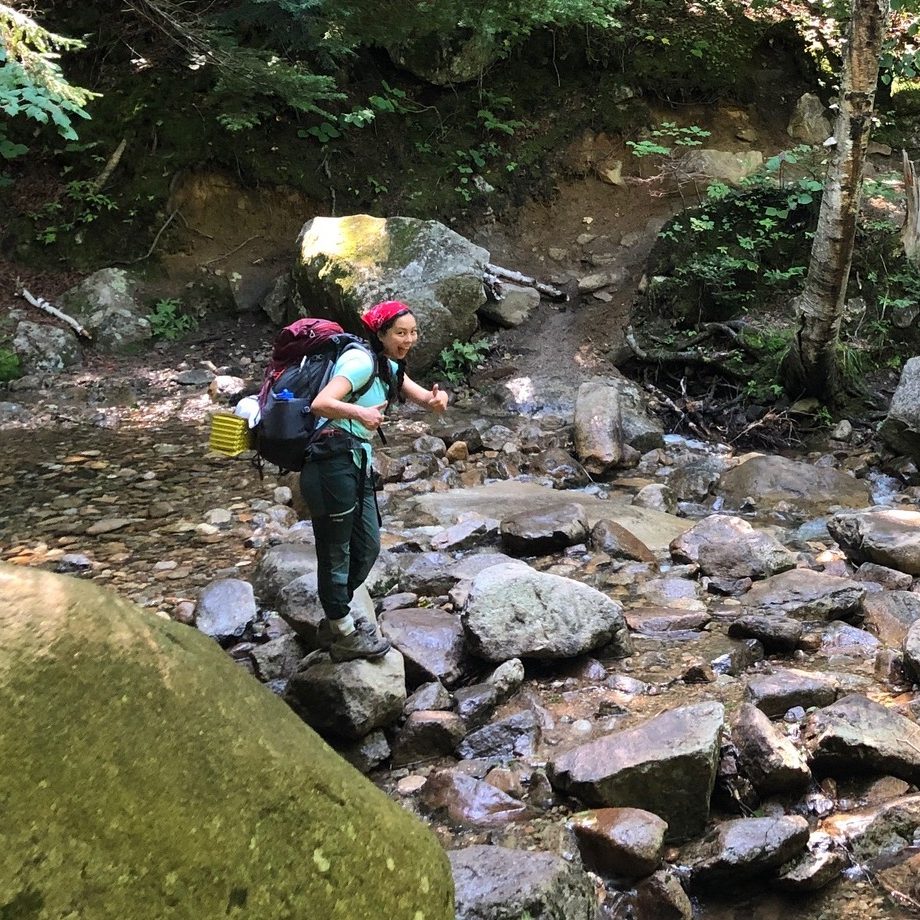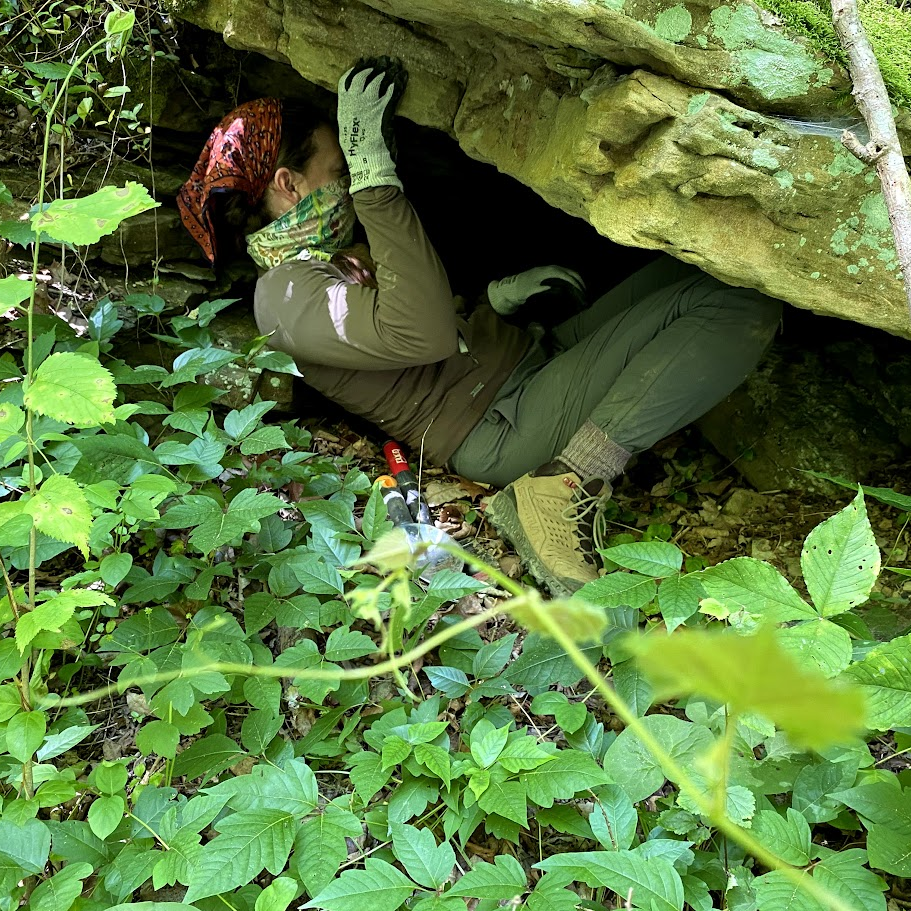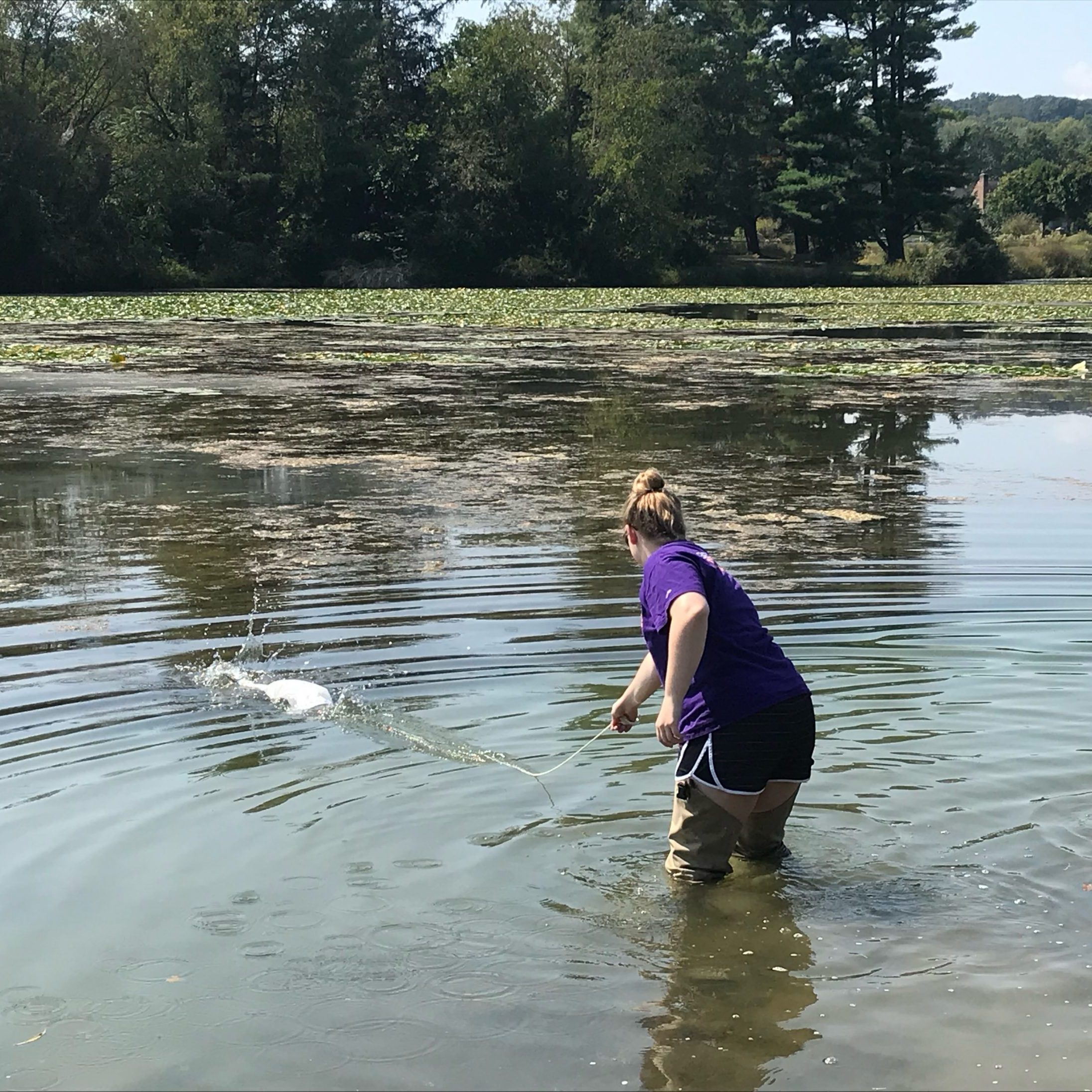

This article was co-written by three people, whom we introduce below, all with different perspectives on undergraduate research. We have tried to outline the ways to best succeed in different stages in one’s undergraduate research career.

Helena: Helena is a current senior at Yale University double majoring in Physics and English. In Summer 2022 she was a Summer Student Fellow (SSF) at WHOI in the Marine Policy Center! At Yale she has worked on research projects related to data from the Arctic Ocean, particle astrophysics, quantum computing, Victorian literature, and start-up innovation.

Brynn: Brynn is a second-year PhD student in the Physical Oceanography department at WHOI, and she studies changes in the ocean over the past 2,000 years. She graduated from Northeastern University, where she participated in two co-op internships - one in machine learning at a defense contractor, and one at a paleoflood lab. In addition, she was a teaching assistant for a summer geology field camp in Iceland.

Emily: Emily is a first-year PhD student in the Marine Chemistry & Geochemistry department at WHOI who recently graduated from James Madison University in Harrisonburg, VA, in 2022. Their research experiences include working in a marine microbiology lab during undergrad and completing an NSF-REU at GA Tech in 2021 studying sediment geochemical cycling. At WHOI, her research focuses on enzyme kinetics and proteomics of carbonic anhydrase.
Before: Helena
So, you’re interested in science—that’s awesome! Maybe there was a class you really loved in college, or maybe you learned about a specific topic that piqued your curiosity. Regardless of what sparked your interest in science, an undergraduate research experience can be a great way to get engaged and test the waters of scientific research.
As an undergraduate, you have ample time to explore different fields of science, so no need to worry about being committed to the same field you start in. In fact, many people find undergraduate research experiences helpful in determining what fields of science they don’t want to pursue further. It might be helpful to start looking at research opportunities in a similar field as your major, but that doesn’t necessarily have to be the case. I've known physics majors who do neuroscience research and chemistry majors who work in engineering labs—it’s totally valid to try out something completely new that you think you would be excited about! Conducting research—especially outside your major—can give you a space to think creatively and think of knowledge you’ve learned in new ways, both critical skills for scientific researchers to have.
Where do you start looking for a research position? The two main paths undergraduates typically take are either research at your home university or doing research through an external program. If your home institution has research labs, doing research can be a great way to build stronger connections with the faculty that you would normally only take classes with. A few ways to find undergraduate research opportunities include:
- If there’s a class you’re really loving, I would recommend asking to meet with your professor outside of class or office hours to talk about how to get involved with their field of research. Most professors love talking about their research, and get especially excited when students express interest.
- Look on your university’s job/research opportunities board. If a professor is taking the time to advertise positions in their lab, they are probably eager to work with students.
- For those not at research institutions, there may be less opportunities to engage in research at your institution. Government agencies, such as the United States Geological Survey (USGS) and the National Oceanic and Atmospheric Administration (NOAA) offer other undergraduate research opportunities. There are also opportunities for students affiliated with tribal colleges, such as the NATURE University Summer Camp. There are also research experiences specifically for students from non-research universities (like CC-CREW at WHOI) Don’t be afraid to cast a broad net!
- Reach out to experienced undergraduate students and ask them about the research they have done! They might also give you ideas of labs or mentors to explore.
- If your home institution doesn’t have many research opportunities that match your interests and you think you would enjoy working with another professor remotely, it’s worth emailing a professor from another university! In the Zoom era, many projects and mentoring can successfully happen from a distance.
It’s important to note that working on research during the semester can be hard, especially if you have a heavy course load or other engagements outside of the classroom. Although time-consuming, it can be a rewarding way to explore new interests and learn how to balance your responsibilities. Additionally, if you work in a research lab during the school year you might be able to use this for work-study hours. If you have too many semester commitments and still want to get involved in research, a summer program, where your main focus is research, might be a great fit.
The second avenue to look for research is through a sponsored summer research program. Participating in research programs can take slightly more time to arrange than directly reaching out to professors, as most positions you have to apply and get selected for. These programs receive a lot of applications, so it’s in your best interest to apply to many: all it takes is one yes! Most programs will match you with a research advisor, pay you, and provide benefits such as opportunities to attend lectures and workshops, a community of other undergraduates doing research, and sometimes free housing and fun program-sponsored events! For example, as a part of WHOI’s Summer Student Fellowship (SSF) program, we got to attend an end-of-summer prom, go on free trips to beautiful places on Cape Cod, like Provincetown, and spend a day on an oceanographic research vessel—all experiences that made us bond as a community of scholars and friends.
A popular way to find research programs is the NSF-REU (Research Experiences for Undergraduates) website, alongside Pathways to Science. It is important to check on specific program websites to make sure you meet the eligibility criteria. Some programs, like PEP at WHOI, are similar to REUs, but offer more resources for underrepresented students in the field. Additionally, if you get involved in a summer project that you love, it’s always worth asking your advisors ways that you can stay involved in the project after the program ends.
Being part of WHOI’s Summer Student Fellowship (SSF) this summer was a transformative experience for me. My research experience was a bit different from my peers, since the Marine Policy Center doesn’t have graduate students, and the field of resource economics was new to me. But just by virtue of living at WHOI, I realized how much learning about the natural world, especially Arctic/Antarctic science, means to me. I made a lot of friendships and wonderful memories hanging out both in Woods Hole and traveling around the Cape Cod area. At WHOI, I found a social, friendly, and academic community that ranged from senior scientists and administrators to graduate students. From our program admin who looked out for us, to the scientists in different departments whom we met, everyone was excited to talk about their experiences and research. I absolutely loved being surrounded by graduate students, and I think that is a highlight of WHOI’s program in particular. Many of them were friendly and made me and the other SSFs feel like we were part of their community, inviting us to join their bike meet-ups, salsa dancing lessons, grad-student organized lecture series, softball, and prom organizing committee. Meeting graduate students meant that beyond my fellow SSFs, I got to befriend even more awesome people with interesting lives (Grad students who have been to Antarctica thrice! Who speak Norwegian, just like me! Who make their own music!) whom I’m so grateful to have known. When I present my summer research at the American Geophysical Union’s (AGU) fall meeting, I’m excited to reconnect and spend even more time with this community.
I have always loved the ocean, and this experience made me aware of all the ocean research that exists and all the remarkable people studying ocean sciences. I can’t emphasize enough how much I would recommend applying to these programs –amidst all the hard work, they are a great way to engage deeply in research but still have a fun summer! I think that’s what undergraduate research can really do: introduce you to new people, possibilities, and ideas that can change the course of your career and life.
During: Brynn
So, you got an undergraduate research position—congrats! In order to get the most out of it, it’s important to think about setting expectations with your advisor. Ideally, undergraduate research should be a mutually beneficial experience for both the undergraduate, and their research advisor. As a student, you should expect to receive mentoring, realistic experiences in the discipline, and some type of compensation (class credits, work-study hours, or hourly wage) for your work. For advisors, demonstrating mentorship is important for career advancement, though additional workers in the lab is clearly a benefit as well. However, setting appropriate and well-communicated expectations early is key. Although undergraduate research will differ from graduate research in its depth and breadth, the same ethos applies for forming an effective relationship with your research advisor. It’s also critical to note that, even if you have a formal meeting to set expectations early on, they can be adjusted and reevaluated at any time.
One key expectation for undergraduates is the level of independence. I found that in more computational roles, like when I worked in a machine learning group, I worked largely on my own with weekly check-ins. While doing fieldwork, I worked with a team or another individual, which felt very different from sitting at a computer by myself! Levels of guidance will vary situationally, but for someone who’s working on a shorter timescale, it’s important that you have enough guidance to make an impact during your tenure. If you notice that other students or technicians seem to require different levels of supervision, remember that comparison is the thief of joy: we all have different backgrounds and capabilities.
Comparing yourself to others can make you feel like your contribution to research is less important than some of your colleagues. This is a common feeling among many undergraduate researchers (and researchers, in general!) but you still absolutely deserve acknowledgement. One example of being a strong advocate for yourself and your work is negotiating authorship on scientific publications. This can feel awkward, but a good research advisor should be comfortable discussing the conventions and process. Never assume that you’ll be given authorship without discussing it with primary authors. The commonly held idea is that anyone who made a “significant scientific contribution” should be an author. The threshold of “significance” varies widely, as well as practices such as author ordering, so be prepared to learn about the culture and advocate for your contributions accordingly. Regardless of whether you receive authorship, you should always be accredited in whatever way is appropriate for the significance of your work (i.e. recognized in the acknowledgment section of a paper, or accredited in a presentation. Nobody should be talking about your work without talking about you!)
It’s common for research to feel like a higher stakes activity than classwork. Although research can be challenging and frustrating at times, it should never be so demoralizing that it makes your life miserable. Make sure to form a community with your peers, which could be other undergraduates, technical staff, graduate students, or postdoctoral scholars. Discussing problems you face with people close to your research can be a good way to brainstorm solutions and receive support or validation. It can also help you broaden your knowledge of what it’s like to work in a field. Your experience may not be entirely representative of working in the field (for better or worse), so it’s important to gain a broader perspective.
After: Emily
So, you’ve done some undergraduate research—that’s pretty awesome of you, congrats! As we’ve mentioned, undergraduate research allows you to test the waters and see whether graduate school is something you’d want to pursue. Whether you choose to go to graduate school or steer away from academia, there are many things to consider before you choose your next path. When I was a senior in undergrad, I had completed an REU but still wasn’t sure whether I wanted to jump in and start a PhD. I decided to just go for it and apply to grad school to see what would happen. Clearly it worked out for me, because here I am writing an article for WHOI’s newsletter!
What are the next steps? It’s critical you know how to talk about and share what research you've done in a lab no matter what path you choose to follow. Having an elevator pitch is a super simple way to quickly and broadly communicate to people what work you’ve done. Additionally, you should update your resume or curriculum vitae (CV) with your experiences listed out (think: what, where, when and with whom). A resume and a CV are different documents, and depending on the field you’re in and how experienced you are, you might consider one or the other. Don’t sweat it if you’re applying to graduate school and you don’t have a CV (which is longer and includes publications) yet. When I was applying to graduate school, I found it really helpful to look at professors’ or graduate students’ CVs as examples (but make sure to not compare yourself and your accomplishments to others who have been in the field longer)!
If you feel like graduate school is the right path for you, we encourage you to check out the other issues of our newsletter in order to better understand the ins and outs of applying. It can be tricky to navigate and there are a lot of unspoken rules about applying to graduate school that we have discussed! If you want to apply to graduate school, having a personal statement will likely be a requirement, so you should begin thinking about how to characterize your past experiences and how they've shaped and helped you learn about your future trajectory. Rather than simply narrating everything you did as an undergrad, you want to explain how those experiences will enable you to become a better scientist. When I was writing my statement, I had to think about how even though the work I was doing didn't go as planned, it allowed me to recognize the importance of failure and how there is so much to be learned within that.
If you feel like taking a 180 career-wise… that’s okay! Working on a project does not commit you to staying in that field indefinitely. After working in both a marine microbiology lab and a sediment geochemistry lab, I felt confident that neither were my direct calling, but rather a combination of the two disciplines. Knowing what transferable skills you gained through your work will be beneficial in marketing yourself for a new position. These don’t necessarily have to be tangible skills like pipetting or coding or culturing, but could be along the lines of developing a strong work ethic and ability to adapt to new environments.
Final Thoughts
To make a very long story about the timeline of undergraduate research short: there is no wrong path that someone takes throughout their academic career. Here we have outlined practices that we hope will help you make the best personal decision and advocate for your success. Whether you stay in academia after completing undergraduate research or you steer towards a different field, there are strategies to best navigate this path and take control of your life to make the most out of your experiences.
Read more of Through the Porthole Issue #7
Learn more about Through the Porthole
Learn more about the MIT-WHOI Joint Program